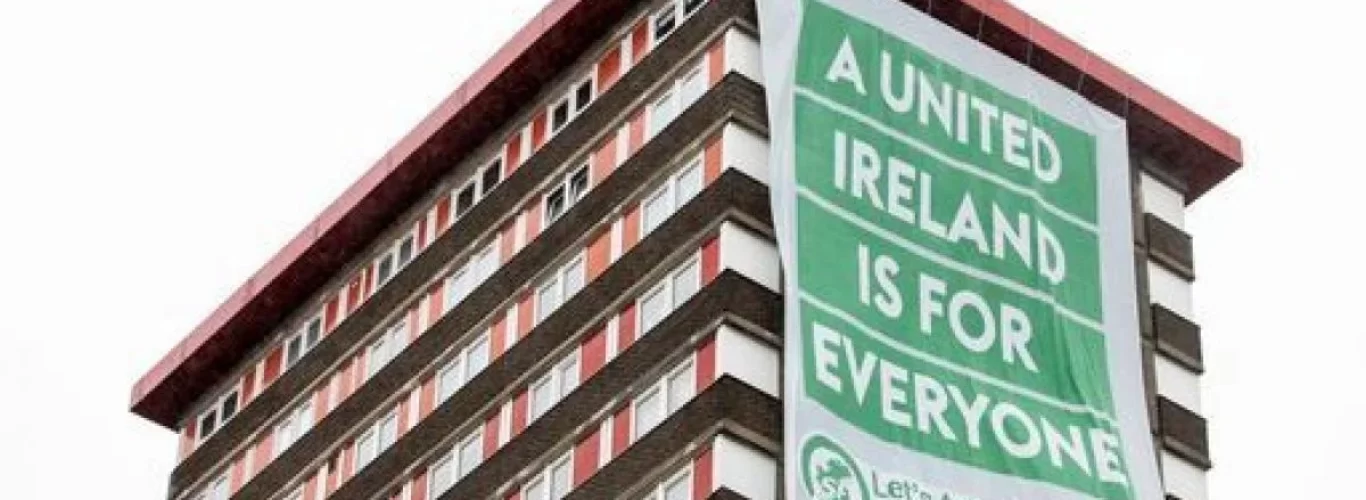As any book lover knows all too well, it always pays to read to the end.
There’s some fascinating stat-nuggets in the recent University of Liverpool/Irish News polling, which showed Sinn Fein extending its lead to 10% over the DUP if fresh assembly elections were held tomorrow.
The main thing that caught my eye, however, was a chart on page 36 of the report assessing public attitudes to Irish unity.
Responding to the prompt: ‘I would vote for a united Ireland tomorrow,’ 43.2% of voters responded that they ‘strongly agree[d]’ or ‘agree[d].’ In contrast, 39.5% said they ‘disagree[d]’ or ‘strongly disagree[d].’
Around one in six (13.3%) ‘neither agree[d] nor disagree[d].’
A lead, then, of 3.7% for Irish unity.
This strikes me as significant for a couple of reasons.
First, the headline figure suggests pro-unity sentiment is in the lead (albeit the poll has a margin of error of 3.1%) on a question that tends to see some people who back unity recoil from the prospect of an early vote without proper discussion and planning.
‘We don’t want another Brexit,’ is a remark I’ve heard many times from otherwise staunch supporters of a united Ireland.
Naturally enough, when the polling question is framed in a slightly different way ‘I would vote for a united Ireland in 15-20 years’ time,’ the lead increases significantly.
This time 46.2% ‘agree’ or ‘strongly agree,’ while just 32.7% ‘disagree’ or ‘strongly disagree.’ (14.7% are not sure).
A lead for Irish unity by a decisive margin of 13.5%.
These findings are also interesting because previous polls from Liverpool University have tended to show much lower support for the idea of Irish unity – which usually sees their numbers cited energetically by supporters of the constitutional status quo.
The university’s last ‘attitudinal survey’ from March 2022 found: ‘30% would vote for a united Ireland tomorrow which only rises to 33.4%…in 10-15 years.’
So, quite a contrast this time around.
Does this reflect a sizable shift in public opinion in the last few months, or issues with the poll’s sampling?
Either way, it seems like a pretty big deal to leave buried on page 36.
Kevin Meagher is author of ‘A United Ireland: Why Unification is Inevitable and How it Will Come About’

As any book lover knows all too well, it always pays to read to the end.
There’s some fascinating stat-nuggets in the recent University of Liverpool/Irish News polling, which showed Sinn Fein extending its lead to 10% over the DUP if fresh assembly elections were held tomorrow.
The main thing that caught my eye, however, was a chart on page 36 of the report assessing public attitudes to Irish unity.
Responding to the prompt: ‘I would vote for a united Ireland tomorrow,’ 43.2% of voters responded that they ‘strongly agree[d]’ or ‘agree[d].’ In contrast, 39.5% said they ‘disagree[d]’ or ‘strongly disagree[d].’
Around one in six (13.3%) ‘neither agree[d] nor disagree[d].’
A lead, then, of 3.7% for Irish unity.
This strikes me as significant for a couple of reasons.
First, the headline figure suggests pro-unity sentiment is in the lead (albeit the poll has a margin of error of 3.1%) on a question that tends to see some people who back unity recoil from the prospect of an early vote without proper discussion and planning.
‘We don’t want another Brexit,’ is a remark I’ve heard many times from otherwise staunch supporters of a united Ireland.
Naturally enough, when the polling question is framed in a slightly different way ‘I would vote for a united Ireland in 15-20 years’ time,’ the lead increases significantly.
This time 46.2% ‘agree’ or ‘strongly agree,’ while just 32.7% ‘disagree’ or ‘strongly disagree.’ (14.7% are not sure).
A lead for Irish unity by a decisive margin of 13.5%.
These findings are also interesting because previous polls from Liverpool University have tended to show much lower support for the idea of Irish unity – which usually sees their numbers cited energetically by supporters of the constitutional status quo.
The university’s last ‘attitudinal survey’ from March 2022 found: ‘30% would vote for a united Ireland tomorrow which only rises to 33.4%…in 10-15 years.’
So, quite a contrast this time around.
Does this reflect a sizable shift in public opinion in the last few months, or issues with the poll’s sampling?
Either way, it seems like a pretty big deal to leave buried on page 36.
Kevin Meagher is author of ‘A United Ireland: Why Unification is Inevitable and How it Will Come About’